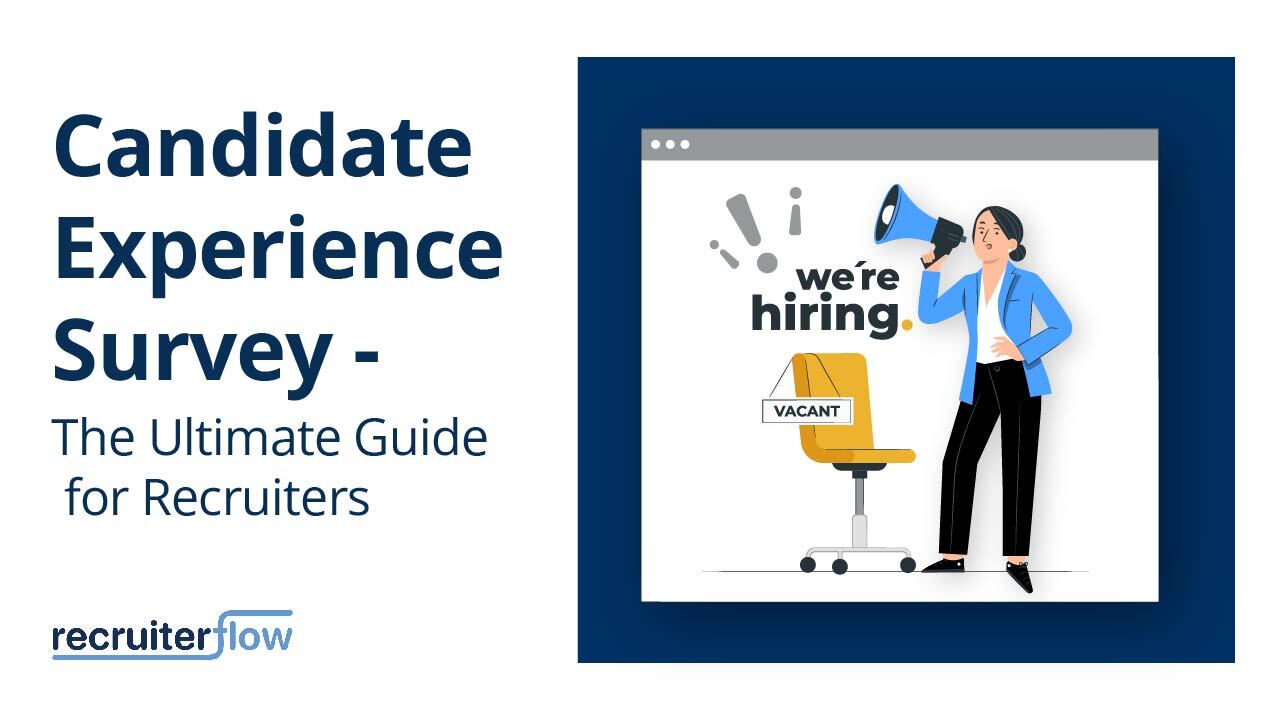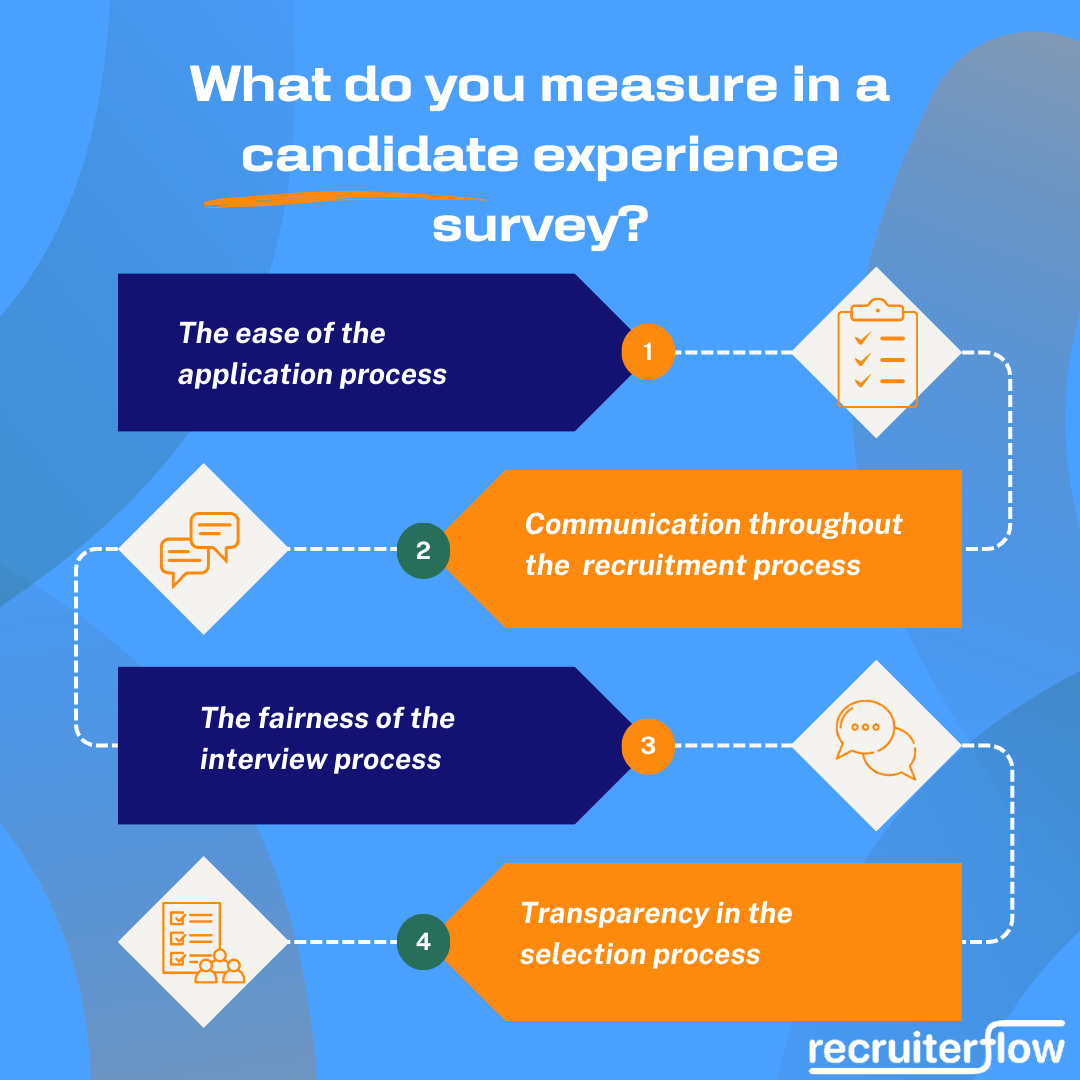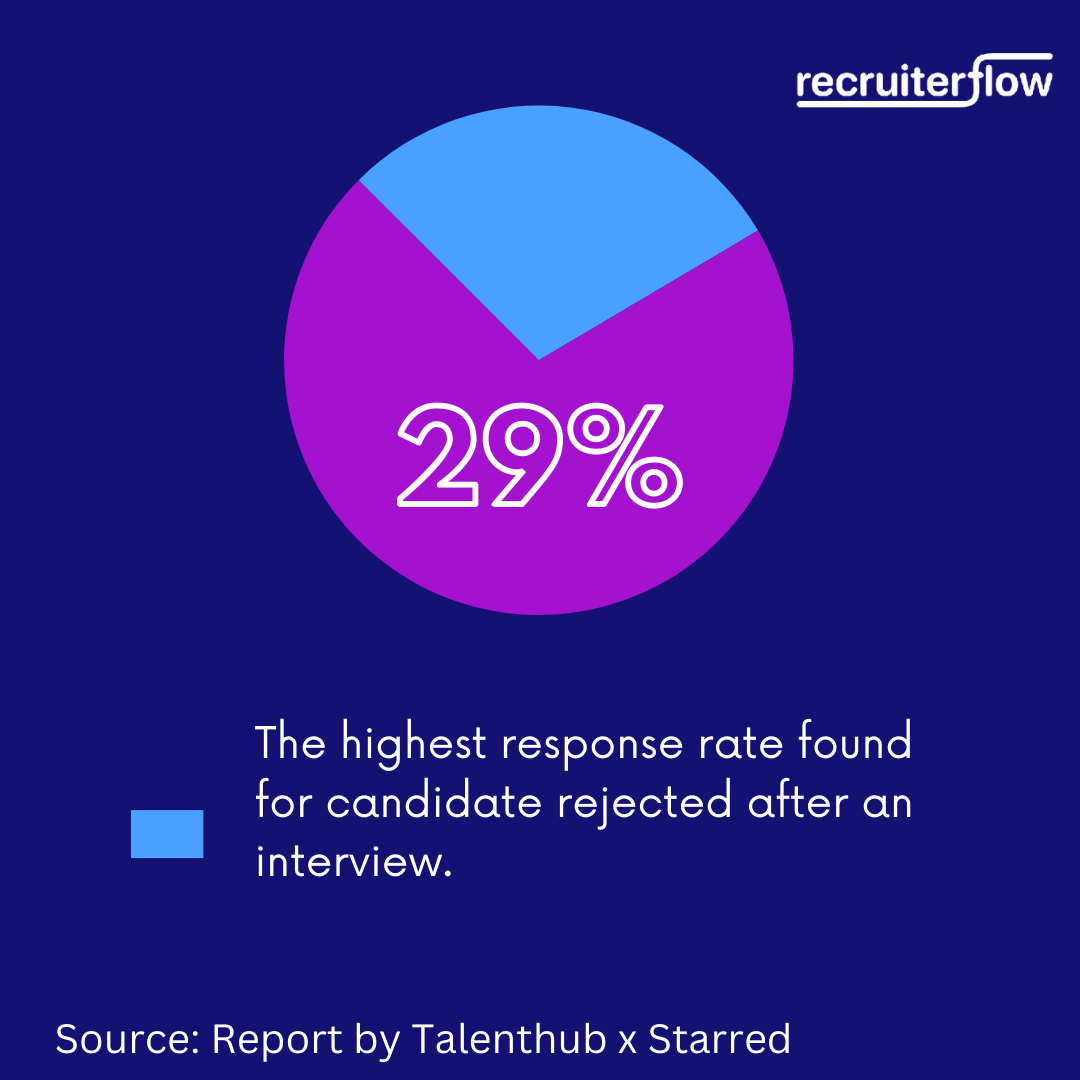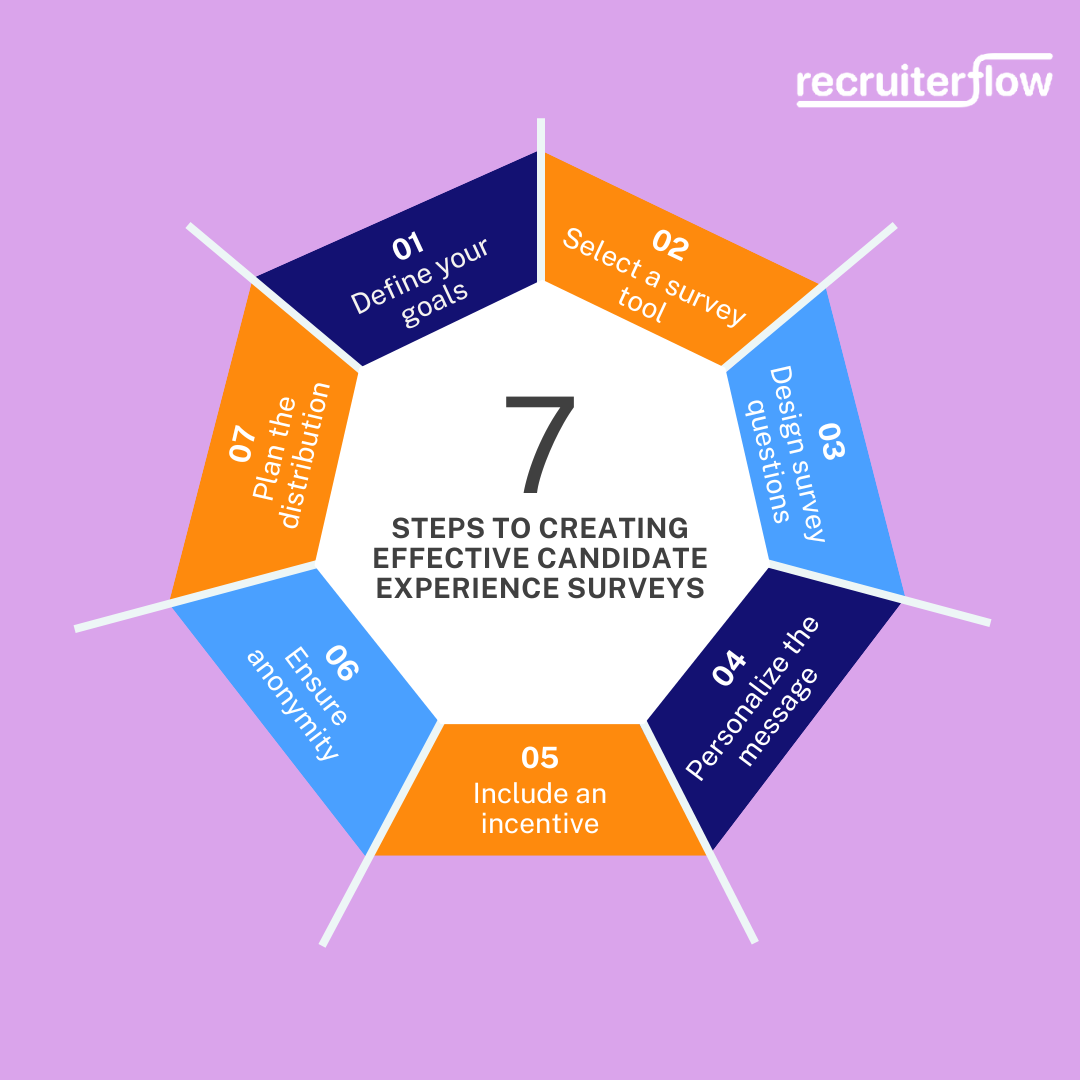
Candidate Experience Survey: The Ultimate Guide for Recruiters
Candidate experience drives your hiring success to a great extent!
How candidates see and perceive their interactions with your agency throughout the hiring process impacts their decision to accept or reject your offer. More importantly, it influences their advocacy or criticism of your organization.
Measuring candidate experience allows you to leverage data to identify candidates’ pain points and preferences and areas for improvement in your recruitment process.
A candidate experience survey is a great way to measure your candidate experience, which involves directly asking your candidates about it.
This blog guide helps you craft the best candidate experience surveys to unlock the full potential of your recruitment effort.
What is a Candidate Experience Survey?
A candidate experience survey is a powerful tool to help you uncover the intricate details of your candidates’ journey throughout your recruitment process. It helps you understand how a candidate feels when moving through different recruiting stages—from application to the onboarding stage.
You can send it after the recruitment cycle ends, and use the response to optimize your recruiting process.

Ideally, the survey assesses candidate experience in the following key areas:
- The process to apply for the role: Is it easy for candidates to figure out the application process? How long does it take to apply? Was the job description inclusive?
- Communication throughout the process: How often have you updated the candidates about the application status? Were you responsive enough to their queries?
- Interview process: Was the interview conducted fairly? Were the questions relevant to their skillset and experience? How well have you briefed the candidate about the company and its culture?
- Selection process: Was there transparency in the selection process? Was the number of interview rounds mentioned in the job description? Are you delivering feedback on every candidate’s application?
- Time to decision: How long are you taking to come to a hiring decision?
Also, check out our blog on strategic interview questions to ask candidates.
Why are Candidate Experience Surveys Important?
The happier your candidates are, the better your chances of hiring quality candidates! There are numerous ways candidate experience surveys benefit both you and your candidates.
- Your candidates get a platform to voice their experiences throughout the hiring process. Using this feedback, you can learn what works in your hiring process and what doesn’t.
- Building a positive candidate experience can significantly enhance your brand.
- Candidate experience surveys provide quantitative and qualitative data to help make data-driven decisions. For instance, if candidates frequently report feeling confused about the next steps after an interview, you can enhance the post-interview communication.
- Use the survey data to benchmark your performance against industry standards or competitors.
Also, check out our blog on how to create a candidate persona.
When to send the candidate experience survey?
Roll out the candidate experience survey as soon as the candidate has completed the hiring process. Especially when a candidate is offered a position, send out the survey as soon as you send the offer letter or start the onboarding.
However, be mindful of a rejected candidate’s sentiments by sending them candidate experience surveys after a decent gap of a few weeks. You don’t want their emotions driving their response to your survey.
Truth be told, it’s the rejected candidates or those who withdrew their applications you need to worry about more. An unhappy candidate can tarnish your brand reputation by leaving negative reviews or bad-mouthing your organization.
Another thing to note is that you should always send candidate experience surveys after the hiring process is complete. Sending it during the process might produce biased feedback from them, thinking that the hiring committee would look kindly on it.

The best approach here is to be in their good books.
- Send timely updates to candidates whether you’re moving them to the next stage or not.
- Provide proper feedback on their interview, so they know where they lack.
- Leave the door open for future positions. While providing feedback or sending rejection emails, make sure to encourage them to apply for future roles or follow your newsletter to learn about future opportunities.
How to Create and Implement a Candidate Experience Survey?

1. Define what you want to measure
Determine the specific goals and objectives of the survey focusing on what you want to learn from candidates.
- Are you focusing on overall hiring satisfaction?
- Do you want to measure candidate experience at specific stages of the hiring process?
- Are there particular aspects like communication or interview experience you want to analyze?

Whatever you decide, remember there are different types of surveys you can send for analyzing candidate experience at each stage or touchpoint of your hiring process. (More of this in the later sections)
2. Select a survey tool
While choosing a survey tool or platform, think of your goals and budget. You can consider popular options like Google Forms, SurveyMonkey, Typeform, and Qualtrics.
Pay extra attention to factors, such as ease of use, customization options, and reporting capabilities.
3. Design survey questions
Craft clear and concise questions that address your objectives. Consider a mix of closed-ended (multiple choice, rating scales) and open-ended questions to gather both quantitative and qualitative data. Make sure the questions are relevant, unbiased, and easy to understand.
4. Personalize the message
When reaching out to an interviewed candidate, keep a warm and friendly tone. Make sure you sound welcoming, empathetic and encouraging enough to get a response.
Additionally, personalize the introduction and thank-you message for each candidate to create a positive impression. Customize question types and response options to fit the context of your recruitment process.
5. Include an incentive
Incentives increase participation rates and encourage engagement. Common incentives include gift cards, discounts on products or services, or professional development resources like ebooks or webinars.
6. Ensure anonymity
Assure candidates that their responses will remain confidential and anonymous to encourage honest feedback. Make it explicit on your surveys to encourage more participation.
7. Plan the survey distribution channels
Here are the best channels to send your candidate experience surveys:
Send the survey link to candidates via email as the primary distribution channel. Craft a compelling subject line and email body. It should entice the recipients to open the email and participate in the survey.
And don’t underestimate the importance of follow-up or reminder emails!
According to a survey, a candidate experience survey got 32% response through reminder emails. So, it’s safe to say sending a reminder email will increase the total response rate by roughly 10%.
Social media
Use social media channels (e.g., LinkedIn, Twitter, Facebook) to connect with the candidates. In these channels, send personalized messages or InMail to recently interviewed candidates, inviting them to participate in the survey.
Don’t forget to reference specific details from their interview experience or interactions with you in your message. This shows you’re genuinely interested in learning about their experience and improving candidate experience to cater to them better.
For better response, engage with candidates’ social media content before and after the interview process. Like, comment, and share their posts to build rapport and establish a positive relationship.
Website popup
Implement a targeted website popup that appears for candidates who have visited specific pages related to the interview process.
- Craft a compelling and concise message for the popup. It should clearly communicate the purpose of the survey and encourage candidates to participate.
- Include a clear and prominent call-to-action (CTA) in the popup. Use action-oriented language such as “Take the Survey Now” or “Share Your Feedback.”
- Make sure the popup is optimized for mobile devices and displays correctly across various screen sizes and resolutions.
- Consider placing the popup on pages of your website frequently visited by candidates. This includes the careers page, job listings, or the thank-you page after submitting an application or completing an interview.
Text message
If candidates have consented to receive text messages, send a personalized text message inviting them to complete the survey.
You can also check our blog on candidate ghosting.
Types of candidate experience surveys and questions to include in them
Just like customer surveys, candidate experience surveys help you analyze how your candidates feel after interviewing with you.
Here are some popular types of candidate experience surveys you can create:
1. Candidate NPS
Net promoter score (NPS) is an excellent way to measure candidate satisfaction with your hiring process. You ask them to rate you on how likely they are to recommend others to apply for open positions posted by you.
Ideally, NPS surveys have no more than 1-2 questions to keep them short and concise for participants. However, since you’re asking candidates to rate their experience, you can add more related questions (requiring yes/no or one-liner answers) to get more context of where they’re coming from.
- On a scale of 0 to 10, how likely are you to recommend [Organization Name] as a potential employer to a friend or colleague?
- What could we do to improve our recruitment process and make it more likely for you to recommend us to others?
- How satisfied were you with the communication received throughout the recruitment process?
- Did you feel adequately informed about the role, responsibilities, and candidate expectations during the recruitment process?
- How would you rate the professionalism and courtesy of our recruitment team?
- Did you feel valued and respected as a candidate during the recruitment process?
- Were there any specific interactions or touchpoints during the recruitment process that stood out to you positively or negatively?
- Would you consider applying for future opportunities with [Organization Name] based on your experience?
Candidate NPS benchmark
Rejected candidates have an overall average of -5 NPS, compared to 39 for
Withdrawn and 80 for Hired candidates.
Rejected after assessment has the lowest average score, at -26, followed by
rejected after phone screen (-12), rejected after application (-8) and rejected after
interview (0).
the least satisfied rejected candidates are sourced
from Indeed, with a low NPS of -19, followed by LinkedIn Ads (-10) and the
Career Page (-9). On the other hand, Internal Applicants have a positive NPS
of 10, and Referrals also report a positive score of 5.
2. Interview surveys
As the name suggests, this type of survey is specifically for understanding what the candidates feel about your interview processes specifically—think difficulty levels of questions, biasing during interviews or their overall interview experience.
- How satisfied were you with the overall interview process?
- On a scale of 1 to 10, how well do you feel the interview process aligned with your expectations?
- Did the interview process provide you with a clear understanding of the role and responsibilities?
- How would you rate the professionalism and friendliness of the interviewers?
- Did the interviewers effectively communicate the company culture and values?
- Were you given sufficient time to ask questions and seek clarification during the interview?
- Were the interview questions relevant to the role and your qualifications?
- Did the interviewers provide constructive feedback or insights about your performance?
3. Survey to measure your experience with the recruiter
Send out this survey when you want to check the efficiency and effectiveness of your recruiters. The response will help you understand if your hiring team is doing a great job or needs some upskilling to get better.
- How satisfied were you with the communication and responsiveness of your recruiter throughout the recruitment process?
- On a scale of 1 to 10, how well did your recruiter understand your skills, qualifications, and career aspirations?
- Did your recruiter provide clear and timely updates about the status of your application and the next steps in the process?
- How well would you say you understand the organization’s mission, vision, and values after your interviews?
- Do you think any part of the interview process was biased?
- What was the outcome of your interview?
4. Survey to understand the effectiveness of your communication process
Effective communication not only ensures that candidates are well-informed and engaged but also reflects positively on your organization’s employer brand.
Here are some survey questions you can pick to assess the effectiveness of your communication process:
- On a scale of 1 to 10, how clear and informative did you find the communication received from our organization?
- Did you feel adequately informed about the status of your application and next steps in the process?
- How would you rate the responsiveness of our organization to your inquiries or requests for information?
- Did the communication from our organization align with your expectations regarding professionalism and clarity?
- Were you provided with multiple channels (e.g., email, phone, text) for communication with our organization? If yes, please rate the effectiveness of each channel.
- Did you receive sufficient communication regarding changes or updates to the recruitment process or timeline?
5. Candidate effort score
Candidate effort score is a metric similar to the customer effort score (CES) that measures the level of effort put in by candidates during the recruitment process.
Factors that could contribute to a candidate’s effort score could include:
- The complexity of the application process
- The clarity of communication from the employer
- The efficiency of scheduling interviews,
- The overall responsiveness and support provided to candidates
A low candidate effort score would suggest that candidates find the process to be smooth, straightforward, and user-friendly.
Here are some sample survey questions to measure candidate effort during the entire recruitment process:
- Ease of Application: How easy was it to find and apply for the job opening?
- Communication Clarity: How clear and informative were the communications you received regarding the status of your application?
- Scheduling Interviews: Did you encounter any challenges or delays in scheduling interviews?
- Interview Experience: How much time and effort did you have to invest in preparing for and attending interviews?
- Feedback and Updates: Were you provided with timely updates and feedback throughout the recruitment process?
- Overall Effort Perception: On a scale of 1 to 10, how much effort did you feel you had to exert during the recruitment process?
To get a quantitative measure of candidate effort, assign a numerical value to each response option, such as 1 for low effort and 10 for high effort. Then, calculate the average score across all survey questions to determine the overall candidate effort score.
Foster a positive recruitment experience for your candidates
A candidate experience survey is an invaluable tool for recruiters looking to optimize their recruitment processes.
The insights gained from these surveys help you gain a deeper understanding of candidates’ perspectives, identify areas for improvement, and make informed decisions to enhance the overall recruitment experience.
So, integrate candidate experience surveys in your recruitment process and embrace data-driven recruiting to create an inclusive and candidate-centric experience!

